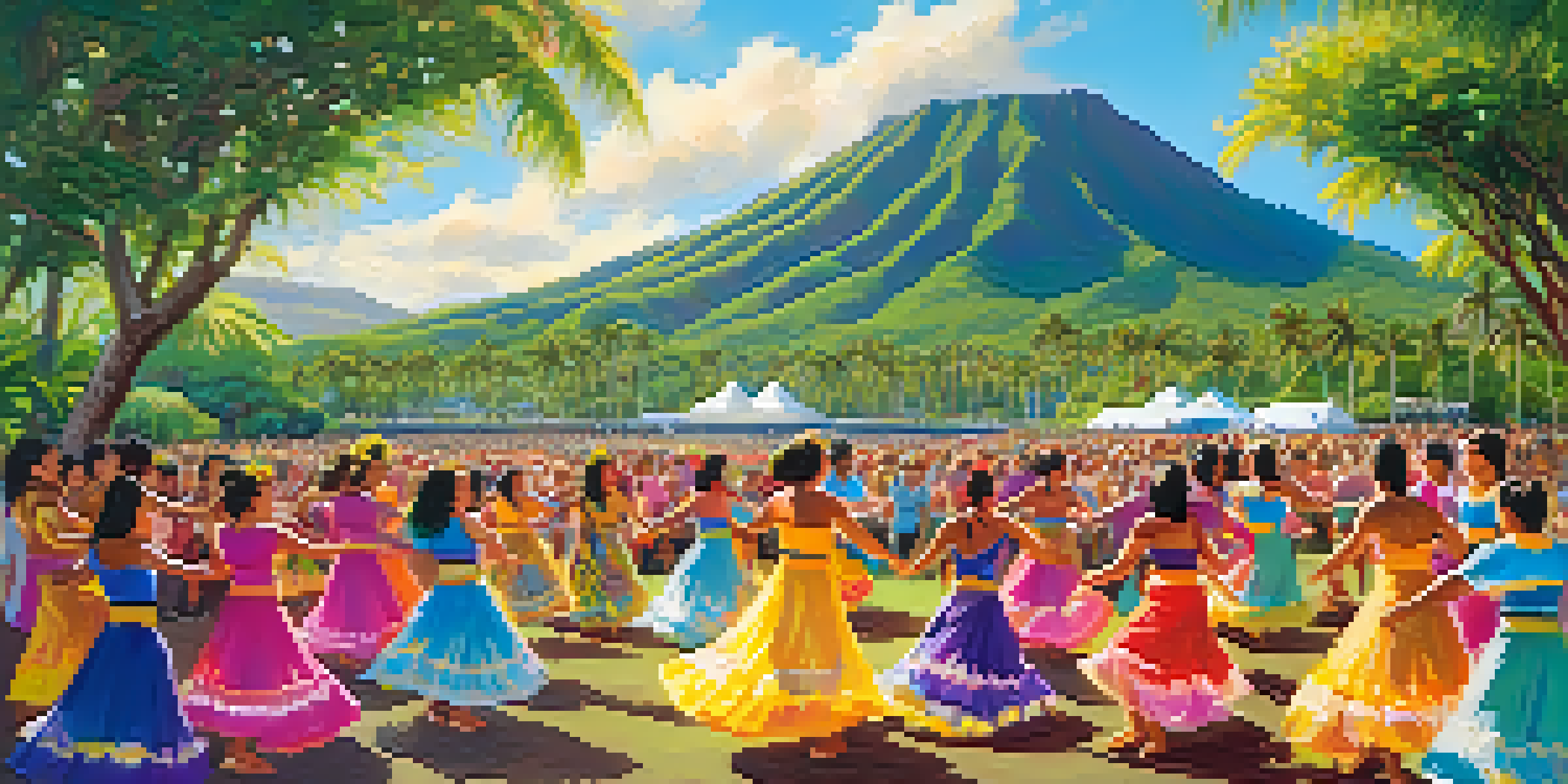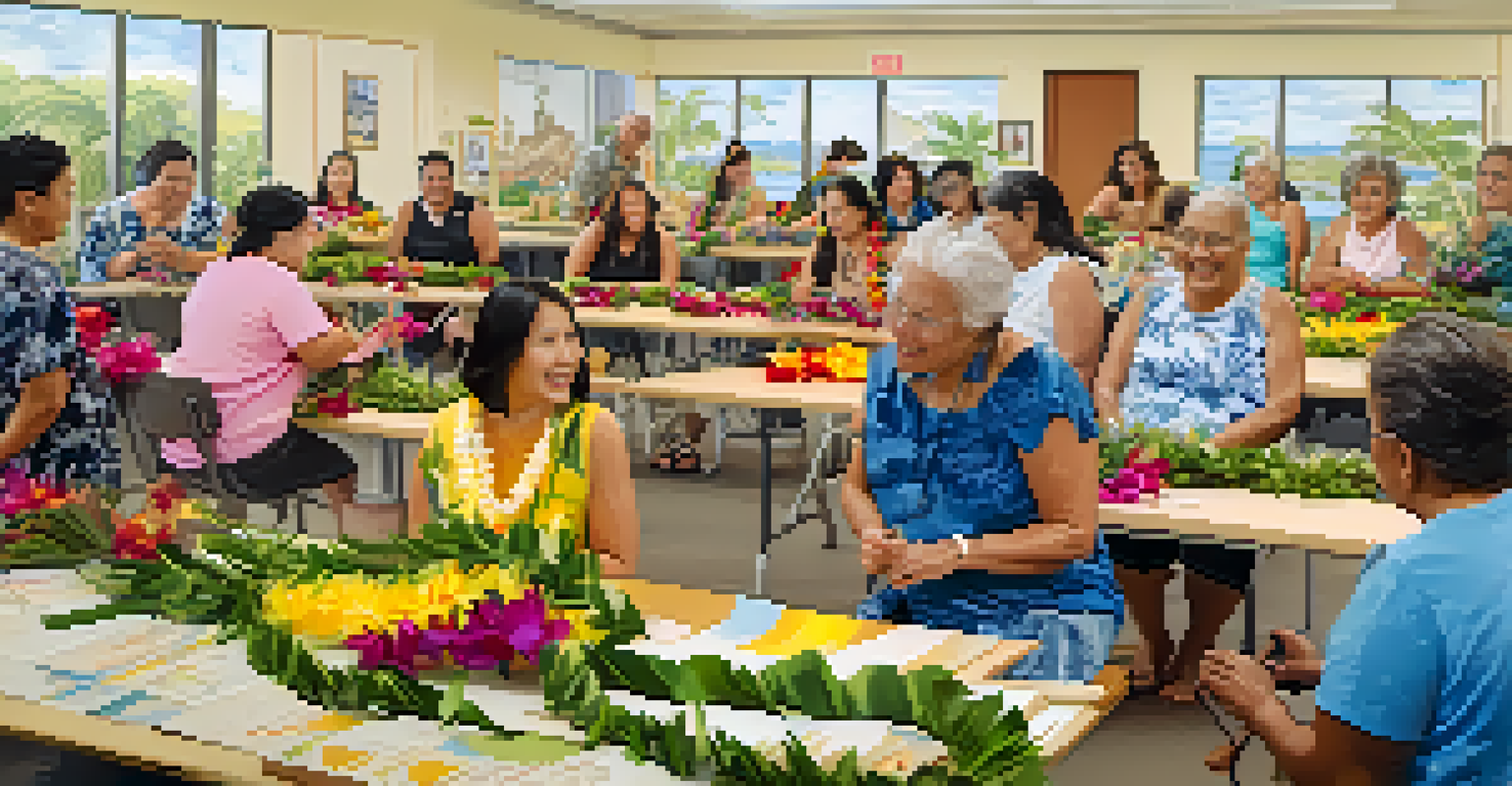Cultural Significance of Honolulu in Hawaiian Sovereignty

Historical Context of Hawaiian Sovereignty
Hawaiian sovereignty has deep historical roots, dating back to the Hawaiian Kingdom established in 1810. Honolulu, as the capital, played a crucial role in governance and diplomacy, making it a center for political activity. Understanding this context is essential to grasp the ongoing struggles for sovereignty and self-determination faced by Native Hawaiians today.
The preservation of one's own culture does not require contempt or disrespect for other cultures.
The overthrow of the Hawaiian monarchy in 1893 marked a pivotal moment in Hawaiian history, leading to annexation by the United States. Honolulu became a focal point for both resistance and cultural preservation as Native Hawaiians sought to reclaim their identity and rights. This historical backdrop continues to resonate in discussions about sovereignty and cultural significance.
Today, the legacy of this history influences contemporary movements advocating for Hawaiian rights. Events commemorating the overthrow and celebrations of Hawaiian culture often take place in Honolulu, reinforcing the city’s role as a hub for sovereignty discussions. This ongoing dialogue highlights how history shapes current cultural and political landscapes.
Honolulu as a Cultural Hub
Honolulu is not only the political heart of Hawaii but also a vibrant cultural hub. The city is home to various cultural institutions, such as the Bishop Museum and the Honolulu Museum of Art, which celebrate and preserve Hawaiian history and art. These institutions serve as important spaces for education and community engagement, fostering a deeper understanding of Hawaiian culture.

Festivals like the Merrie Monarch Festival and Aloha Festivals showcase traditional Hawaiian practices, music, and hula. These events attract both locals and visitors, fostering appreciation for Hawaiian culture while reinforcing community ties. The celebration of these traditions in Honolulu highlights the importance of cultural identity in the sovereignty movement.
Historical Roots of Hawaiian Sovereignty
Understanding the overthrow of the Hawaiian monarchy in 1893 is crucial to grasp the ongoing struggles for sovereignty faced by Native Hawaiians.
Moreover, the preservation of the Hawaiian language and traditional practices is evident in educational programs throughout Honolulu. Schools and community organizations actively promote the use of 'Ōlelo Hawai'i (Hawaiian language), ensuring that future generations maintain their cultural heritage. This commitment to language and culture is vital for the continued fight for sovereignty.
The Role of Activism in Honolulu
Activism in Honolulu plays a crucial role in the ongoing fight for Hawaiian sovereignty. Various grassroots organizations, such as the Hawaiian Sovereignty Movement and Protect Kahoʻolawe ʻOhana, mobilize community members to advocate for land rights and cultural preservation. Their efforts highlight the resilience and determination of Native Hawaiians to reclaim their heritage.
In every generation, there are those who will stand up for their rights, and those who will stand by and accept the status quo.
Protests and demonstrations frequently occur in Honolulu, addressing issues such as land development and environmental protection. These actions not only draw attention to the struggles faced by Native Hawaiians but also foster a sense of unity among activists. The city serves as a backdrop for these movements, amplifying their voices on a national and global stage.
In addition to grassroots efforts, prominent figures in Honolulu advocate for sovereignty through political channels. Leaders and representatives work to influence legislation that supports Native Hawaiian rights, pushing for recognition and reparations. This intersection of activism and politics is crucial for advancing the cause of Hawaiian sovereignty.
Cultural Education and Awareness
Cultural education in Honolulu is essential for fostering awareness about Hawaiian sovereignty. Schools and community programs often focus on teaching the history and significance of the Hawaiian Kingdom, emphasizing the importance of self-determination. This education lays the groundwork for understanding the broader implications of sovereignty.
Workshops, lectures, and cultural events contribute to this educational effort, involving both Native Hawaiians and non-Hawaiians. By sharing stories, traditions, and perspectives, these initiatives help bridge gaps in understanding. Cultural education not only empowers Native Hawaiians but also fosters respect and appreciation among visitors and residents alike.
Honolulu as a Cultural Epicenter
Honolulu serves as a vibrant cultural hub that fosters appreciation for Hawaiian traditions and identity through festivals and educational programs.
Furthermore, universities in Honolulu offer programs that promote Hawaiian studies and cultural preservation. These academic initiatives encourage research and dialogue around sovereignty issues, equipping students with the knowledge to engage in advocacy. The emphasis on education reflects the belief that understanding history is vital for shaping a better future.
Cultural Resilience in Honolulu
Cultural resilience is a defining characteristic of the Hawaiian community in Honolulu. Despite historical challenges, Native Hawaiians continue to practice and celebrate their traditions, demonstrating strength and adaptability. This resilience is evident in the revival of traditional art forms, music, and dance, which connect past and present.
Community gatherings and cultural workshops foster a sense of belonging and identity among Native Hawaiians. These spaces allow individuals to share their experiences, learn from each other, and reinforce their cultural ties. The vibrancy of these activities is a testament to the enduring spirit of the Hawaiian people.
Moreover, cultural resilience extends to environmental stewardship, as many Native Hawaiians actively engage in conservation efforts. By protecting sacred sites and natural resources, they reaffirm their connection to the land. This holistic approach embodies the idea that sovereignty encompasses not only political rights but also the preservation of culture and environment.
Honolulu's Global Influence
Honolulu's significance extends beyond the islands, influencing global conversations about sovereignty and indigenous rights. As a popular tourist destination, the city presents an opportunity to educate visitors about Hawaiian history and culture. This exposure helps raise awareness about the ongoing struggles faced by Native Hawaiians, broadening the dialogue on sovereignty.
Cultural exchange programs and international partnerships foster connections between Honolulu and other indigenous communities worldwide. These collaborations provide a platform for sharing experiences, strategies, and successes in the pursuit of sovereignty. Through these interactions, Honolulu emerges as a model for indigenous activism and cultural preservation.
Activism Drives Sovereignty Efforts
Grassroots activism in Honolulu plays a vital role in advocating for Hawaiian rights and cultural preservation, highlighting the community's resilience.
Additionally, the global recognition of Hawaiian cultural practices, such as hula and lei-making, enhances the visibility of Native Hawaiian culture. This recognition not only brings pride to the local community but also highlights the importance of supporting sovereignty movements. As Honolulu continues to shape global narratives, its cultural significance remains paramount.
Future of Hawaiian Sovereignty in Honolulu
The future of Hawaiian sovereignty in Honolulu hinges on the collective efforts of the community and its allies. Continued activism, cultural education, and resilience will play vital roles in advancing the sovereignty movement. As younger generations become more engaged, the hope is that they will carry forward the legacy of their ancestors.
Collaboration between Native Hawaiians and non-Hawaiians is essential for creating a supportive environment for sovereignty efforts. Building bridges and fostering understanding can lead to meaningful partnerships that amplify the voices of Native Hawaiians. This collaborative spirit is crucial for addressing the challenges that lie ahead.

Finally, as Honolulu continues to evolve, the commitment to cultural preservation and sovereignty must remain at the forefront. With ongoing discussions about land rights, political representation, and cultural education, the path forward will require dedication and unity. The future of Hawaiian sovereignty is bright, with the potential for lasting change rooted in the rich cultural heritage of Honolulu.